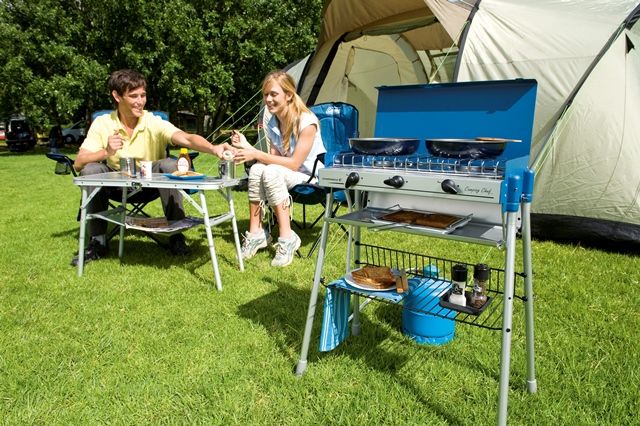 LPG should be a safe product if properly handled and used. It is non-toxic and will only burn when sufficient air is present, but then it is highly flammable.
LPG should be a safe product if properly handled and used. It is non-toxic and will only burn when sufficient air is present, but then it is highly flammable.
Cooking inside a tent is not advisable, unless a suitable cooking area is provided such as one in a trailer tent with kitchen annex and plenty of ventilation. Modern synthetic fabrics used for tents have many advantages but tend to be far more susceptible to heat damage than cotton canvas and do not provide as much ventilation. Cooking outside can be done under a porch canopy, but make sure the appliance is kept well away from the tent fabric. In all cases be aware of the dangers of carbon monoxide poisoning - see online at www.myccc.co.uk/COsafety for more details.

Ventilation is important as gas appliances give off the products of combustion and can therefore be dangerous inside a tent, especially if used for long periods. Remember they will use oxygen as they burn, so even a gas lantern can eventually dangerously deplete the breathable air inside. Modern tents, especially those with sewn-in groundsheets, have ventilation designed for people, not gas appliances.
Great care needs to be taken when changing cylinders or cartridges. Make sure you are familiar with the way the cartridge or cylinder fits on the appliance or regulator and always carry out the changeover in the open air, never in a tent or building and never near naked flames. Dispose of empty gas containers with care. Never throw them on a fire because any gas residue could lead to an explosion. If you suspect an appliance or gas container is leaking, particularly if liquid gas starts to spray out, get everyone away from the appliance until the container is empty and the gas has dispersed naturally.
When travelling and on site ensure the cylinder or cartridge is kept well away from any source of heat or ignition. Keep it upright at all times (unless it is designed to be used otherwise) and away from damp, dirt, dust or anything that could damage the container or its valve equipment. If you have the use of a trailer keep the gas supply in there and not in the car and avoid keeping a cylinder in your tent overnight.
Remember:
- NEVER use a naked flame to look for leaks. A pungent smell is added to the gas to make it easy to detect. The gas is heavier than air and will pool on the ground
- If a pierceable cartridge leaks, allow it to empty naturally in a well-ventilated area and do not attempt to disconnect or reconnect it
- Always turn off the gas on a conventional cylinder before disconnecting for travel
- Never smoke when changing cylinders or cartridges
- Make sure all ventilation spaces are clear of obstructions
- Site gas appliances away from flammable materials before lighting and never move them when lit
- Carry a suitable fire blanket and/or fire extinguisher, know how to use it and make sure it has not passed its expiry date
- Be aware of the dangers of carbon monoxide poisoning and consider using a CO alarm - see www.myccc.co.uk/COsafety.
If you have feedback on our new format Datasheet, please let us know, using our short Feedback Form.